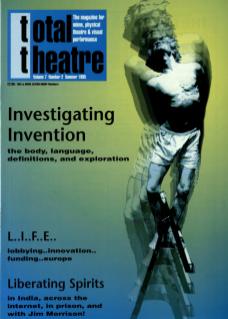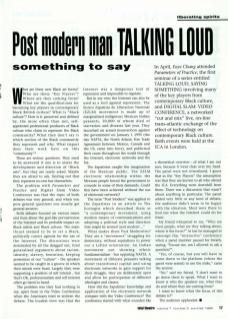What are these new Black art forms? Who are these ‘Key Players’? Where are they coming from?
What are the qualifications for becoming key players in contemporary Black British culture? What is ‘Black culture’? How is it perceived and defined by, the more often than not, self-appointed professional producers of Black culture who claim to represent the Black community? What they don't say is which section of the Black community they represent and why. What impact does their work have on this ‘community’?
These are serious questions. They need to be answered if one is to assess the development and direction of ‘Black arts’, but they are rarely asked. Maybe they are afraid to ask, finding out that they represent no-one but themselves.
The problem with Parameters and Practice and Digital Slam: Video Conference was that the topic of both debates was very general, and when you pose general questions you usually get general answers.
Both debates focused on various issues and fears about the god-like pervasiveness of the Internet and its probable impact on Black artists and Black culture. The main thrust seemed to be to set a Black, politically correct agenda for the use of the Internet. The discussions were dominated by all the dragged out, tired generalised arguments about racism, identity, slavery, feminism, keeping possession of our ‘culture’ – the speakers seemed to be caught in a groove in which their minds were fixed. Largely they were supporting a position of self interest, but that's OK, professionalism and self interest often go hand in hand.
The problem was they had nothing to say, apart from in the Video Conference when the Americans tried to enliven the debate. The loudest view was that the Internet was a dangerous tool of repression and impossible to regulate.
But in my view the Internet can also be used as a tool against repression. The Enrico Zapatista de Liberacion Nacional (EZLM) movement is made up of marginalised indigenous Mexican Indian peasants, 30,000 of whom died of starvation and diseases last year. They launched an armed insurrection against the government on 1 January 1995 (the day NAFTA, the North Atlantic Free Trade Agreement between Mexico, Canada and the US, came into force), and publicised their cause throughout the world through the Internet, electronic networks and the fax.
The Zapatistas caught the imagination of the Mexican public. The EZLM electronic relationship within the Mexican people forced the government to concede to some of their demands. Could this have been achieved without the use of electronic networks?
The term ‘Post Modern’ was applied to the Zapatistas in an article in The Ecologist which described them as ‘a contemporary movement, using modern means of communications and adopting a political style and direction that might be termed “post modern”...’
What makes them Post Modernists? They are a ‘movement’ struggling for democracy, without aspirations to power nor a Leftist orientation. An Indian movement not showing ethnic fundamentalism – but opposing NAFTA. A movement of illiterate peasants talking about transitional capital and using electronic networks to gain support for their struggle, they are deliberately open and allow for participation of different ideologies and classes.
How did the Zapatistas' knowledge and application of the electronic network compare with the Video Conference? The conference started with what sounded like a theoretical overview – of what I am not sure, because it went clear over my head. The panel were not introduced, I guess that as the ‘Key Players’ the assumption was that they are known to all who attend the ICA. Everything went downhill from there. There was a discussion that wasn't about anything in particular. The panel added very little or any kind of debate, the audience didn't seem to be happy with the situation. Most were there to find out what the Internet could do for them.
My friend whispered to me, ‘Who are these people, what are they talking about, where is the focus?’ At last he managed to interrupt this ‘interactive’ conference when a panel member paused for breath, saying, ‘Excuse me, am I allowed to ask a question?’
‘Yes, of course, but you will have to come down to the platform [where the panel were seated] to use the mike,’ came the answer.
‘No,’ said my friend, ‘I don't want to go down there to speak. What I want to know is who the speakers are, what they do and where they are coming from? I want to know what the focus of this debate is?’
The audience applauded.

